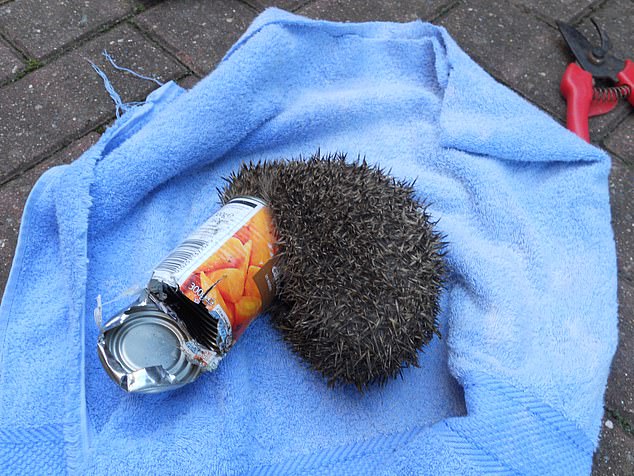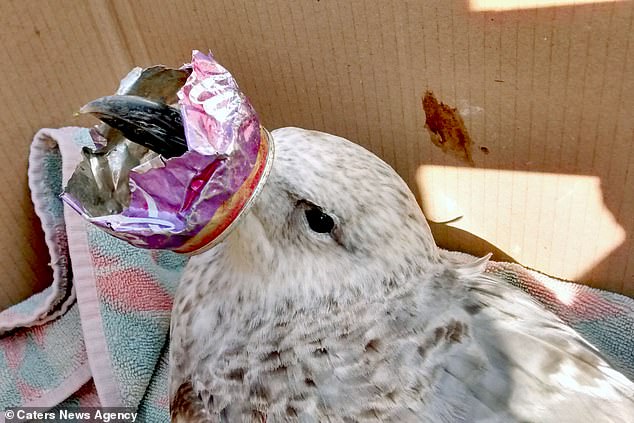How roadside rubbish kills up to ten animals a day: hedgehogs, squirrels, deer and foxes fall victim to litter
Roadside litter injures, traps or kills 10 animals every day, the RSPCA has revealed.
The animal charity has warned that in the past three years they have received more than 10,000 reports of animals distressed or even killed by discarded waste.
Separate research from National Highways shows that almost half of people are unaware that fruit peels and apple cores – which attract wildlife to their deaths – count as litter.
A survey of 2,000 people also found that a third incorrectly believe that leaving behind organic waste is beneficial to nature.
While more than 90 percent say they have never thrown litter on the roadside, more than 60 percent say they have seen someone else do it.
Roadside litter injures, traps or kills 10 animals every day, the RSPCA has revealed

The animal charity has warned that in the past three years they have received more than 10,000 reports of animals distressed or even killed by discarded waste.
National Highways warned that people are unaware that discarded rubbish and fruit can attract animals, often with fatal consequences.
They have launched a campaign, supported by the RSPCA and environmental charity Keep Britain Tidy, asking people to ‘lend a paw – pick up your rubbish’.
As part of a long-term effort to rid roadsides and highway service areas of trash, National Highways has conducted a trial using AI cameras in partnership with a local enforcement authority.
They have also trialled billboards to reduce litter on highways, used geofencing to send text messages to motorists entering car parks where litter is a problem, encouraging them to take their rubbish home, and will ninth year taking part in the upcoming Great British Spring Clean. run.
Nick Harris, CEO of National Highways, said: ‘Litter is a terrible social problem. Not only is it ugly, it can also have deadly consequences for nature, turning roadsides into deadly roadside restaurants.
‘We are working hard to tackle it on our roads, with our people clearing litter every day. To keep them safe we have to close motorway lanes, which delays motorists and costs millions of pounds.
‘But if people don’t leave any waste at all, it doesn’t have to be collected. That is why we urge road users to take their waste home with them.’
RSPCA chief conservation officer Geoff Edmond said: ‘We welcome National Highways’ campaign to raise awareness of the dangers wildlife face from roadside litter.
‘Our rescuers deal with thousands of incidents every year where animals are affected by litter.

A separate National Highways survey found that more than 90 percent of people have never thrown litter on the side of the road, while more than 60 percent say they have seen someone else do it.
‘Old cans and bottles, plastic items and even disposable vape caps are just some of the items that pose a danger to our wildlife, including hedgehogs, squirrels, deer and foxes.
‘Animals can swallow the litter, become trapped in it or be attracted to old roadside food, putting them at risk from vehicles.
‘Unfortunately, for every animal we can help, there are likely many more animals that go unseen, unreported and could even lose their lives.
“But it’s very easy for the public to help. When people take to the roads, we urge them to hold on to their waste until there is an opportunity to dispose of it safely and responsibly – or recycle it where appropriate. As we all strive to create a better world for every animal, this could save an animal’s life.”
Allison Ogden-Newton OBE, CEO of Keep Britain Tidy, said: ‘Our roads are a graveyard for small mammals and other wildlife attracted to the litter and drinks that drivers illegally throw from their vehicles.
“We are pleased that National Highways is launching this long-awaited campaign, which is squarely aimed at encouraging motorists to do the right thing, collect their waste and protect these precious, highly biodiverse areas that are home to so many animals.”
Research from Keep Britain Tidy in 2018 found that up to three million animals died on the roadside every year, trapped in litter such as bottles and cans.
Among them were birds, small mammals and larger animals such as badgers and deer. Due to the increase in the number of vehicles on the road network since that study was carried out, the number of animals killed by litter could now be higher.
